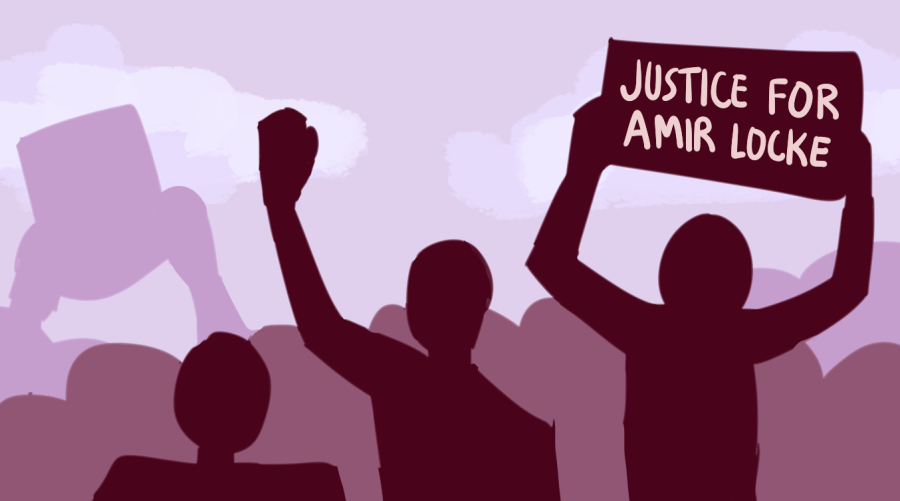Minneapolis calls for justice after Amir Locke murder
Locke’s death has sparked outrage and condemnation of police brutality across Minnesota.
February 28, 2022
After the deaths of George Floyd and Daunte Wright, the city of Minneapolis once again has found itself in the national spotlight after the fatal shooting of Amir Locke. Locke was fatally shot in a raid conducted by the Minneapolis Police Department, as they had acquired a search warrant for suspects involved in a homicide a week earlier. Body camera video obtained from the incident shows officers bursting into Unit 701 of the Bolero Flat Apartments at 6:48 a.m. on February 2nd, 2022. Locke, who was resting on his couch during the incident, is seen in the video pointing a gun at one of the officers and is immediately shot three times, twice in the chest and once in the wrist.
The entire incident lasted only 10 seconds. Locke was transported to the Hennepin County Medical Center, where he was pronounced dead at 7:01 a.m. Locke’s death has sparked outrage and condemnation of police brutality across Minnesota.
“My heart is with the family and friends of Amir Locke. An investigation is underway so we don’t have all the facts yet, but a 22-year-old life ending in gunfire is a tragedy,” Governor Tim Walz said in a statement released on February 4th. In a press conference, Amir Locke’s family described the manner of his death as “an execution,” claiming that Locke was a “deep sleeper,” and was likely startled by the commotion unfolding in front of him.
“We know that we are not going to let them sweep Amir’s death under the rug, as they attempted to initially. His family, led by his mother and father, are going to fight to say that Amir Locke’s life matters,” the family lawyer Benjamin Crump said.
Locke’s death has drawn criticism towards the usage of no-knock warrants—search warrants that allow for officers to enter premises without knocking or announcing their presence to residents.
Antonio Romanucci, another lawyer representing the Locke family, voiced his concern for the execution of the raid through the usage of a no-knock warrant. “Had they announced who they were and why they were there, this tragedy could have been averted…but because they executed in the manner in which they did, Amir was doomed to die,” Romanucci said.
Olivia Smith, a freshman and member of Edina High School’s Black Student Union, says that hearing the news of Locke’s death disappointed her. “I was just mad. This happened with Breonna Taylor, and it’s so sad that this could happen again; it’s sad that so many innocent black people in Minnesota are being killed,” Smith said.
Smith also details how Locke’s death has stoked fears for her own personal safety. “It’s making me feel scared to start driving and doing stuff on my own. It is sad that having a different skin color will make you get treated poorly by [people with power],” Smith said. As a response to Locke’s death, Mayor Jacob Frey announced a moratorium on the usage of no-knock warrants in the city of Minneapolis. Several protests demanding justice for Locke’s death have sprung up all throughout the Twin Cities.
On Tuesday, February 8th, close to 1,000 students marched from Central High School to the Governor’s Mansion in St. Paul in protest. At the request of the Locke family, the majority of these protests have remained peaceful.
“Twenty-two days of peace. I want you all to start with 22 days of peace,” Locke’s father, Andre Locke said.



